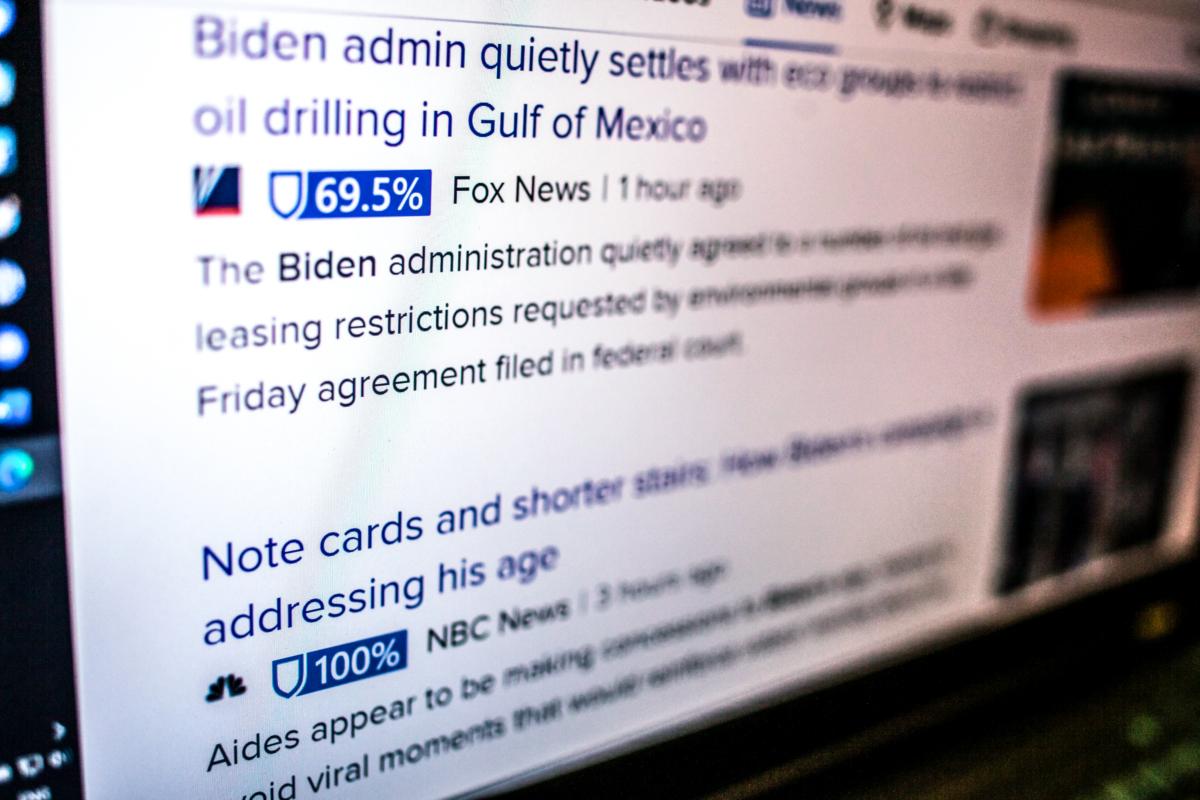How NewsGuard became the establishment guard against independent media

Petr Svab
Founded in 2018, NewsGuard dispatches its “analysts” to prepare reviews of online content creators and to issue ratings “to help readers have more context for the news they read online.” The ratings display as small badges with scores next to search results.
That, however, represents only a small part of the picture. The bigger picture shows that NewsGuard's most potent function stems from its relationships with advertising agencies, which have steered their clients to cut off advertising dollars for content creators disfavored by the company's "analyst" reviews. As it so happens, corporate, establishment-friendly media tend to receive high scores while independent media skeptical of the establishment tend to receive low scores, even if they adhere to high journalistic standards.
The Epoch Times emailed NewsGuard questions regarding its products, activities, personnel, and funding, but received no response.
Subjective Criteria
NewsGuard presents itself as objective and nonpartisan. Its ratings, the company says, measure media quality on nine criteria, including transparency of authorship and ownership and adherence to standard editorial practice, such as issuing corrections and labeling opinion pieces. In practice, however, most of the score boils down to whether the media present content that, in NewsGuard’s opinion, is truthful.
The ?rst criterion speci?cally looks at whether the target repeatedly publishes false claims. Another examines whether it publishes news “responsibly.” But failing the ?rst one means failing the second one, NewsGuard explains on its website. Yet another criterion is whether the target uses accurate headlines.
Again, if the headline says something NewsGuard considers to be untrue, that counts as a failure. Another criterion looks for a policy of regularly correcting errors—or what NewsGuard considers to be errors. Together, these four criteria add up to more than 60 points of the 100-point score.
Even if NewsGuard can’t ?nd anything to dispute, it can still dock points if the target doesn’t su?ciently represent opinions the company would like to see.
Such content providers “egregiously cherry pick facts or stories to advance opinions,” it argues.
Meanwhile, at least 60 points are needed for NewsGuard to issue its “credible” rating.
This methodology becomes particularly problematic when NewsGuard itself is wrong on the facts. For example, during the height of the COVID-19 pandemic, the company considered false the notion that the SARS-CoV-2 virus was leaked from a lab in Wuhan, China. If a news outlet with a perfect score responsibly reported on the extensive circumstantial evidence indicating a lab leak, it ran the risk of NewsGuard decimating its score and falsely labelling it an “unreliable” source that “severely violates basic journalistic standards.”
The COVID-19 origins issue was a rare case in which NewsGuard eventually issued a correction, though it only went as far as saying that the lab leak hypothesis couldn’t be completely ruled out.
While fact-checking others, NewsGuard apparently has its own opinions to advance. There have been many examples where media outlets found themselves in NewsGuard’s crosshairs for publishing views that question establishment orthodoxies on topics such as climate change, vaccine safety, COVID-19 restrictions, the Ukraine war, the World Economic Forum, and others. On these issues, NewsGuard seems to act as a guard of the establishment narrative, demanding that content creators toe the line.
“I’ve had interactions with them where it was very obvious that they were anything but objective,” said John Tillman, chairman of the nonpro?t Franklin Foundation, which runs newswire service The Center Square.
More often than not, outlets poorly rated by NewsGuard tend to be on the right side of the political spectrum.
The Media Research Center (MRC), a conservative media watchdog, reported that NewsGuard gave left-leaning outlets scores 22 points higher on average than right-leaning outlets. The 2021 report was based on a review of NewsGuard ratings for more than 50 major news outlets sorted for left or right bias by AllSides, a company that measures media bias based on blind studies of content and editorial reviews.
Newsguard criticized the MRC report, saying it cherrypicked the outlets for the study and that the sample was too small. MRC retorted that the list included all news outlets reviewed by AllSides.
When MRC repeated the study in late 2022, the disparity had increased to 25 points.
“Unlike the major fact-checking organizations, NewsGuard at least lives up to its name in that it’s a guard for the left’s news,” Matt Palumbo, researcher for conservative podcast “The Dan Bongino Show,” writes in his upcoming book “Fact-Checking the Fact-Checkers.”
In November 2019, NewsGuard contacted the website RealClearInvestigations (RCI) and questioned its use of anonymous sources to reveal the alleged identity of the whistleblower who initiated the impeachment of President Donald Trump. RCI responded by asking NewsGuard if it was reaching out to The New York Times, The Washington Post, CNN, NBC, or BuzzFeed to question their use of anonymous sources. NewsGuard reportedly didn’t respond.
When conservative education platform PragerU was slapped with a red label by NewsGuard, PragerU CEO Marissa Streit attempted to rectify the situation in good faith, she said.
“We really believed it was a mistake,” she told PragerU founder Dennis Prager during an interview on his podcast.
In response, she received “basically a list of demands,” she said.
NewsGuard wanted PragerU to stop criticizing the COVID-19 lockdown policies, stop questioning the safety of the COVID-19 vaccines, stop talking about any COVID-19 treatments not endorsed by the government, stop questioning the seriousness of climate change—and the list went on.
“Part of their demands were basically dictating to us what kind of content we’re allowed and not allowed to share,” she said.
NewsGuard also demanded a list of PragerU’s donors, which the nonpro?t refused to share out of concern that the donors would be targeted.
“They want to smear these people. That’s the only reason they want their names,” Mr. Prager said.
In PragerU founder Dennis Prager's view, NewsGuard lacks respect for the pursuit of truth through di?erences in opinion.
Ms. Streit did try to make changes to satisfy some of NewsGuard’s demands and to see how it would respond.
“The goalposts kept changing. Every time we would make a change, they would want more changes,” she said.
When PragerU commentator Amala Ekpunobi did a podcast questioning the motives of the World Economic Forum, NewsGuard demanded that the video be taken down, Ms. Streit said.
In Mr. Prager’s view, NewsGuard lacks respect for the pursuit of truth through di?erences in opinion.
“I still haven’t noted what did we say that’s misinformation, as opposed to [an opinion on which] honorable people can di?er,” he said.
The bad rating caused PragerU’s video-hosting provider, JW Player, to abandon it, Ms. Streit said.
PragerU has since launched an online petition against NewsGuard.
“They are powerful in a very bad, malevolent, malicious, destructive way,” Mr. Prager said.
NewsGuard has argued that its process is fair because it reaches out to the rated outlets for comment and includes the comments in the rating writeup.
Yet based on PragerU’s experience, it appears this practice may well be a mere formality and whatever arguments the outlets present don’t a?ect the ?nal rating. Sooner or later, it seems, the targeted outlets simply give up and write o? NewsGuard from that point on.

Anthony Watts founder and editor of WattsUpWithThat.com and a fellow with the Heartland Institute. (heartland.org)
Anthony Watts and Charles Rotter run WattsUpWithThat.com, a blog for content skeptical of catastrophic consequences of climate change.
In their view, NewsGuard is not acting in good faith.
“They are purposefully focused on destroying the credibility of websites they don’t like,” Mr. Watts, a fellow with the Heartland Institute, told The Epoch Times.
Earlier this year, NewsGuard sta?er Zack Fishman reached out to Mr. Watts about several articles. One mentioned that the arrest of climate activist Greta Thunberg was “staged.” Mr. Fishman took issue with that, saying it was a real arrest. But Mr. Watts explained that he was talking about the manner in which Ms. Thunberg was arrested. A video circulating online showed that the police o?cers arresting her were posing for pictures holding her while she was smiling and laughing before they led her away.
“It boils down to a disagreement with the reviewer,” Mr. Watts said.
“They apply these sort of credentialist straw man games,” Mr. Rotter said.
“It’s like, ‘We found this study that contradicts what this person said, therefore you’re wrong.’”
But even if what Mr. Fishman found were real errors, it seemed too minor to impeach or call into question the credibility of the entire blog, which NewsGuard did.

Newsguard attaches credibility ratings to news outlets and other content creators. (Petr Svab/The Epoch Times)
Mr. Fishman brought to Mr. Watts’s attention three or four articles with claims he was able to contradict. But the site has posted tens of thousands of articles. NewsGuard itself suggested its ratings shouldn’t be a re?ection of the factuality of a small number of speci?c pieces of content.
“Our ratings do not mean that a site with a poor rating will never get a story right, or that a site with a strong rating will never get a story wrong,” Matt Skibinski, general manager of NewsGuard, told Breitbart.
NewsGuard has argued that what it looks at is journalistic criteria—when it points out errors, are they corrected?
But Mr. Watts wasn’t refusing to correct errors. He believed those weren’t errors to begin with, but rather issues of legitimate disagreement and opinion.
“These people are like robots. It’s very di?cult to actually have a discussion with them,” Mr. Rotter said.
Establishment Guard
According to Mike Benz, former head of the digital desk at the State Department and now head of the Foundation for Freedom Online, NewsGuard is part of a broader censorship industry that emerged over the past six years or so. The industry players aren’t primarily partisan, he noted, but rather pro-establishment. Right-leaning outlets can receive high NewsGuard scores—as long as they follow the establishment’s narratives on speci?c topics.
The industry was born in response to the wave of populism that has swept the West since 2015, starting with Brexit and the election of President Donald Trump and continuing with major populist leaders in other countries, including Marine Le Pen in France and Matteo Salvini in Italy, Mr. Benz explained.
The establishment blamed online media, including social media, for citizens voting the “wrong” people into power, he said.
“From the 1940s until the present, there has been this bipartisan conception of foreign policy," he said. "There is this uniparty axis that was being broken apart by the rise of free and unfettered news online that was growing to such popularity that the gatekeepers of national security state-aligned media, such as The New York Times, The Washington Post, and the majors, like CBS, ABC, NBC, were now no longer the dispositive forces on elections around the world, particularly in the United States and across the EU.
“NewsGuard basically grew out of this soup in 2017 as the national security state and various opportunists on both sides of the political aisle, in particular the neoconservative wing of the GOP and pretty much all of the Democrat Party, except the anti-war left, joined together with various elements of the national security state, including the Pentagon, the State Department, and the intelligence services, to come up with basically a plan to end the popularity and availability of alternative news online.”
Mr. Tillman reached a somewhat similar conclusion.
“What they’re really trying to do is control information ?ow, because they don’t like the democratization of information,” he said.
NewsGuard’s Advisory Board is littered with pro-establishment ?gures. Its most notable member is Gen. Michael Hayden, former head of the CIA and the NSA—an “apex predator of the national security state,” as Mr. Benz put it.
READ THE FULL STORY: TheEpochTimes.com




























Comments
The Agenda Is Censorship, Not Facts
Comment